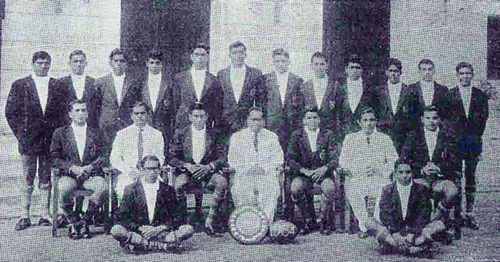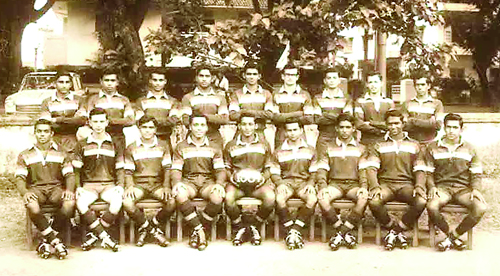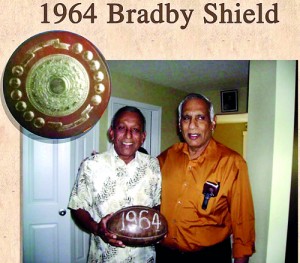There was amazing comradeship
Ladies and gentlemen, former ruggerites of Royal and Trinity, friends and colleagues of the Bradby teams of 1964. Looking around it’s great to see so many familiar faces of rugby players of a by-gone era, albeit some looking younger, some looking wiser, and most looking extremely wealthy. Times appear to be very good especially for yesteryear ruggerites from the two colleges, and that’s how it should be.

Royal College Rugby 1964
Be that as it may, I have been tasked tonight with the toasting of two great schools of learning, Royal College Colombo, and Trinity College Kandy. But I must confess that I have been fighting shy of toasting anything for sometime now since my last effort at toasting virtually ended up in smoke. Nevertheless there was no way I could refuse my former batchmate, teammate, and close friend, Laki Hettiarachchi when he requested me to take up this onerous task. “Only for 5 to 7 minutes” he said and so I agreed.
I think it is only appropriate that I first refer briefly to the two legs of the ‘64 Bradbies especially as we are commemorating the 50th anniversary of these two games tonight. As I take my mind back to those two games, I very vividly recall that 40 yard solo gallop of Royal’s wing three Brian Lieverze, which ended in a superb try, the only points scored in the first leg that year at Longdon Place and which gave Royal a slender three points advantage to take us through to Kandy and for the second leg.

Trinity College Rugby 1964
Up at Kandy, who could forget those spectacular drop kicks, four in all, by the late doctor Laki Dissanayake, which rightly earned him a place in rugby immortality and history. It was truly a splendid display of drop kicking never seen before and very unlikely to be seen hereafter. I think the best kick of all was the one from almost the half way line which just dipped under the cross bar. I also remember very vividly that quick silver, illusive, blind side try by Mohan, a superb Sahayam special which took the Royal defence completely by surprise especially our blind side defence; I am sure Hetti may be able to fill us up with more details of this try later on in the evening. Finally I will not forget that sweetly executed, scintillating, three quarter move by the Royal backs where everyone of them handled the ball from the late Rohan de Zoysa at scrum half, to Claudius Jayadeva, to Gemba Gunawardena, to Mousie Thuriaratnam who waltzed through that powerful Trinity defence and slipped the ball to Brian Lieverze to fall over the line and score, giving the match and the Bradby to Royal. Somewhere in between was another great drop goal put over by Trinity’s Brian Munaweera.
The two colleges have been battling it out for Bradby supremacy since 1945 when the shield was donated by the late Mr. E.L. Bradby former principal of Royal. The battles have been fast and furious throughout the 68 years, and the tally as at date reads as 64 matches won by Trinity, 62 by Royal and 11 matches drawn. Both colleges were founded in the 19th century, Royal in 1835 when Rev. Joseph Marsh was principal and Trinity in 1872 under the Principalship of Rev. Richard Collins.

Tronoto 2010: Keith (Right) handing a rugby ball to Mohan (Left) used in the 1964 Bradby.
Trinity was founded by the early Anglican missionaries to the country and was steeped in Anglican church tradition in most of their College activity, proudly boasting today of one of the finest chapels amongst Christian Colleges in the island and located on the College premises. Trinity today claims to be one of the leading Anglican colleges in the country. Originally known as the Kandy collegiate school, the name change to Trinity College came in 1876 in honour of Rev Ireland Jones the founder of the Kandy Collegiate school; Rev Jones hailed from Trinity College Dublin.
Royal college began as the Colombo academy and was a Govt sponsored institution, and later on in 1881 took on the name of Royal College, and is today not only the premier Govt school but justly claims to be the foremost amongst all Colleges in the country.
Both Royal and Trinity grew to be leading public schools in the island, formatted on the traditional public schools of the British Isles, where most of the early principals to the two colleges hailed from.
Both colleges developed meaningful school anthems providing inspiration, fervour, and attachment to the respective colleges and the students. Royal’s ‘school of Our Father’s’ was written by our former principal major H.L. Reed, whilst Trinity’s anthem was written by Sir Henry Newbolt an English poet, novelist, and historian.
‘Respice finem’ Trinity’s motto written in 1873 by the then principal, urged all Trinitians to look to the end, and Royal’s motto, ‘disce aut discede’ learn or depart was thought to be a harsh watchword, and written in 1871 by principal George Todd.
As the years went by Royal and Trinity both stood the test of time, enduring arduous, challenging and changing times, through good times and bad times, stumbling along the way at times perhaps, but steadied and guided through many a rough passage by great and skillful principals who never faltered from maintaining the highest traditions of public school administration, discipline, and education, which the two colleges were endowed with from inception.
The two schools taught their sons to face up to every kind of life situation, triumphs and disasters, victories and defeats, upsides and downsides, joys and disappointments, in the true spirit of sportsmanship and learning, not only in the sporting arena but also in the classroom. If I am to borrow some words and phrases from the anthems of these two colleges, they taught their sons to learn of books and men and learn to play the game, in the school of our fathers, they taught their sons to honour yet the school we knew, honour yet the rules we knew, in the best school of all.
These are institutions, consequent to all these traditions, principles, education, sportsmanship and ideals, have produced men of the highest calibre in all walks of life, men who could talk with crowds and keep their virtue, men who could walk with kings and never lose the common touch.
Today most of us are on the threshold of that biblical and proverbial age of three score years and ten. Some are on the bonus side of this age, while others who were with us, who played and learnt with us, are no longer with us, they have crossed the great divide answering the last bells call, and yet all of us have imbibed of the true meaning of learning inculcated by these two great colleges for which we are eternally and ever grateful.
Friends, before I conclude I would like to leave you with this thought;
“Time is like a river, you cannot touch the same waters twice, the flow that passes by will never pass again, so make the most of every moment of time”
Ladies and gentlemen please rise, take your glasses to hand and drink a toast to these two great seats of learning, Royal College Colombo, and Trinity College Kandy!


